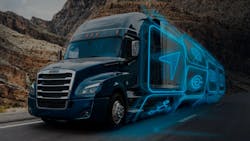DTNA launches Virtual Vehicle, a Platform Science-powered open OEM fleet management platform
Daimler Trucks North America (DTNA) is launching the Platform Science-powered Virtual Vehicle. This first open OEM platform enables fleets to access telematics, software solutions, real-time vehicle data, and third-party applications directly from their vehicles, the truck maker announced on Nov. 9.
The platform provides the tools to manage those applications, connectivity, and the mobile devices drivers need to use them. The Virtual Vehicle launch comes about 18 months after DTNA invested in Platform Science. The OEM—which manufactures the Freightliner and Western Star brands—named the transportation technology company its primary on-vehicle fleet management software partner in May 2020.
“With Virtual Vehicle, we offer our customers an open digital solutions and services platform that allows them to choose fleet applications that best meet their needs,” said Sanjiv Khurana, head of the connected services group at Daimler Truck. “The system is seamlessly enabled in our trucks, without the need for installing any additional telematics hardware or the associated costs and loss of uptime. Through our collaboration with Platform Science, we are building on the strong connectivity already integrated into our trucks, and offering unprecedented flexibility, efficiency, and scalability.”
DTNA continues to expand its fleet solutions beyond vehicle sales and service. With the new platform, the truck maker said it will enhance the driver experience by offering “nearly limitless software-enabled and ROI-enhancing applications.” DTNA said it is the first OEM to use cloud, edge, and in-dash technology to provide native in-vehicle mobile technology that allows customers to distribute, manage, and enable driver applications and connected vehicle services.
The platform gives fleets the flexibility to choose third-party apps, mix or match telematics service provider (TSP) applications, or use their own apps. This, according to DTNA, will allow truck buyers to customize their experiences down to an app-by-app and driver-by-driver level for the first time. It also gives fleets the ability to create in-cab technology experiences that best suit their specific business objectives.
Leading up the Virtual Vehicle, Platform Science developed its fleet telematics software by focusing on the people who depend on the technology every day. The company’s product developers spent several years working with Schneider and tech installation provider Velociti, immersing themselves in daily fleet operations—from back office and maintenance operations to spending thousands of hours on the road with commercial truck drivers.
“We wanted to go to the end of the barbell and focus on the actual people who had to use those solutions in the back office and the people who had to use it in the cab, and we focused on the experience,” Jack Kennedy, Platform Science co-founder and CEO, told FleetOwner last year. “We wanted to see what problems they were struggling with that should have been addressed by technology, but for whatever reason had not been.”
Virtual Vehicle allows third-party developers to create apps that can offer ROI for fleets and quality-of-life improvements for drivers through its developer toolkit. Virtual Vehicle provides the tools needed to manage the mobile devices that come and go from the vehicle without installing or changing on-vehicle mobile gateways or telematics units.
DTNA said the Virtual Vehicle platform offers four key benefits to fleets:
- Productivity: With factory-installed telematics hardware, fleets can maximize uptime by avoiding installation delays and costs for complementary hardware.
- Flexibility: Virtual Vehicle allows fleets to create a software experience catered to individual business needs through a growing pipeline of developer-created innovations.
- Accessibility: Virtual Vehicle leverages edge, cloud, and in-dash data to optimize networks, keeping data available 24/7/365, even when fleets are offline.
- Cost-effective: Users of participating applications on Virtual Vehicle benefit from usage-based billing.
“Before Virtual Vehicle, OEMs, enterprise fleets, and developers were restricted in their ability to innovate because hardware and software were so interconnected. It was difficult to change one without impacting the other,” Kennedy said. “Virtual Vehicle finally unlocks that. Fleets can now choose software anytime they want, without the inconvenience and wasted investment in hardware that customers have historically had to deal with just to get new apps. We are thrilled to partner with DTNA and support them on this journey to make customers’ lives easier and easier as the world innovates faster and faster.”
Platform Science’s Virtual Vehicle is available on Freightliner Cascadias manufactured Sept. 9, 2019, or later as a monthly subscription.
About the Author
FleetOwner Staff
Our Editorial Team
Kevin Jones, Editorial Director, Commercial Vehicle Group
Josh Fisher, Editor-in-Chief
Jade Brasher, Senior Editor
Jeremy Wolfe, Editor
Jenna Hume, Digital Editor
Eric Van Egeren, Art Director
